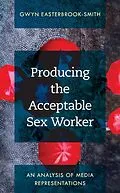Producing the Acceptable Sex Worker considers how sex work is produced in news media narratives, a site where much of the general public draws its understanding of the industry in the absence of lived interaction with it. Taking New Zealand as a case study, this book considers an emerging discourse of acceptability for some sex workers, primarily those who do low-volume indoor work. Their acceptability is established in comparison with other kinds of sex workers, resulting in a redistribution but not a reduction of stigma. The conditions attached to acceptability reflect persistent anxieties aboutsex work: workers who are acceptable must give the impression that the sexual labour of the job is enjoyable and virtually indistinguishable from their personal life, eliding the work involved. Unacceptable workers have existing marginalisations magnified by their association with the industry, with migrant sex workers produced as devious or exploited, and transgender women's involvement with the industry used to deny them the right to public space. The conditions attached to acceptability reveal how neoliberal discourses of choice, desire, authenticity, and personal responsibility inform the formation of sex work in the public eye.
Autorentext
By Gwyn Easterbrook-Smith
Klappentext
Producing the Acceptable Sex Worker considers how sex work is produced in news media narratives, a site where much of the general public draws its understanding of the industry in the absence of lived interaction with it. Taking New Zealand as a case study, this book considers an emerging discourse of acceptability for some sex workers, primarily those who do low-volume indoor work. Their acceptability is established in comparison with other kinds of sex workers, resulting in a redistribution but not a reduction of stigma. The conditions attached to acceptability reflect persistent anxieties aboutsex work: workers who are acceptable must give the impression that the sexual labour of the job is enjoyable and virtually indistinguishable from their personal life, eliding the work involved. Unacceptable workers have existing marginalisations magnified by their association with the industry, with migrant sex workers produced as devious or exploited, and transgender women's involvement with the industry used to deny them the right to public space. The conditions attached to acceptability reveal how neoliberal discourses of choice, desire, authenticity, and personal responsibility inform the formation of sex work in the public eye.
Inhalt
Preface and Acknowledgements
Chapter 1: Introduction
Sex and Work
Sex work in New Zealand
Sex work as work
Researcher positionality
Stigma and the Sex Industry
What is stigma?
How is stigma applied to sex work?
How does this stigma affect sex workers?
What approaches exist to resist this stigma?
Sex Work in the News Media
The role of the media
People don't know sex workers, but they watch TV
Media analysis and news media
New Zealand's media landscape
Chapter 2: Objects of Study
Existing Research into Media Representations
Naming the Sex Working Subject
Who Speaks and Who is Spoken About
Discursive Slippage and Questions of Voice
Images and Motifs of Sex Work
Chapter 3: Intertextuality and Responding to Stigma
In/Visibility as Acceptability
Normative Identity Categories and Community
The Sex Worker as Disease Vector
Sex Work and the Assumption of Violence
The Constrained Nature of Intertextual Narratives
Chapter 4: Comparative Acceptability
Cisgender and Transgender Sex Workers: Vulnerable or Vilified
Transgender workers as a physical threat
Transgender workers as a moral contagion
Migrant Sex Workers and Narratives of Economic Scarcity
The early 2010s: the Rugby World Cup and Student Sex Work
Migrant sex workers and trafficking
Migrant sex workers as an economic threat in 2018
Indoor Workers, Work Volume, and Class Position
Conclusion
Chapter 5: Denying Legitimate Labor
Migrant Workers: Deceptive or Exploited
Street-Based Sex Work: Disrupting 'Legitimate Businesses'
Indoor Sex Work: A Conflation of Work and Play
Sex work as temporary or supplementary
Invisible affective labour
Anything But Work
Chapter 6: Neoliberal Discourses of Choice and Pleasure
Sexual Labour, Sexual Pleasure, and the Right 'Choice'
The Un/Availability of Choices
Removing Management from the Picture
Chapter 7: The Making of the Sex Worker, the Remaking of Stigma
Bibliography
References
Media Texts
About The Author
